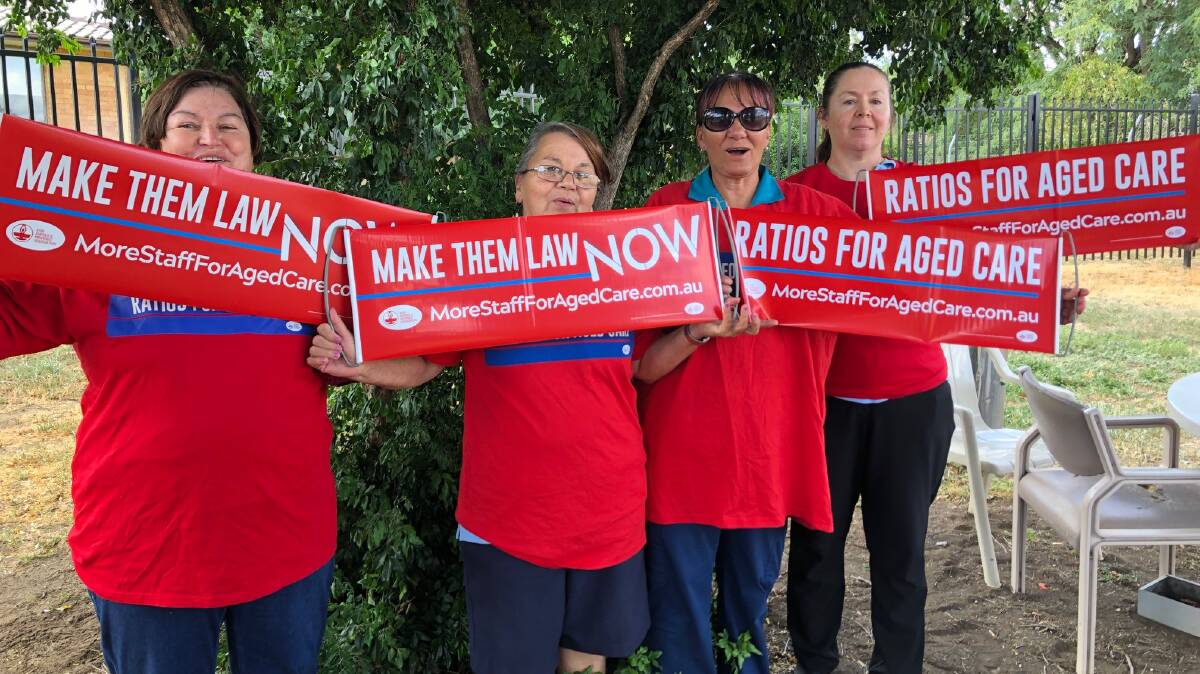
Moree aged care nurses are calling on the government to legislate mandated staffing ratios to improve patient care and safety within the aged care sector.
Subscribe now for unlimited access.
or signup to continue reading
Australian Nursing and Midwifery Federation (ANMF) and NSW branch organiser Jane Campbell was in Moree on Wednesday, February 27 to meet with local members to renew the push for mandated staffing ratios and skills mix in aged care facilities.
It also ties in with the Royal Commission into aged care quality and safety which began hearings earlier this month.
The ANMF believes the systematic sub-standard and inadequate care provided to vulnerable nursing home residents can be addressed by not only ensuring adequate staffing but by having a good skill mix of employees.
“We’re saying our elderly deserve a competent staff filled with a good mix of RNs (registered nurses), ENs (enrolled nurses) and AINs (assistants in nursing) or personal care workers," Ms Campbell said.
“We’ve seen a decrease in RNs and ENs over recent years."
The ANMF is calling for staffing to be made up of 30 per cent RNs, 20 per cent ENs and 50 per cent AINs. The ratio is, in general, currently about 13 per cent RNs and 70 per cent AINs.
Fairview Retirement Village NSWNMA branch official Maree Wiseman said at Fairview, there is often only one RN rostered on after hours caring for up to 97 residents.
Fairview facility manager Jane Mackney said this is standard across the board. She also said it's very difficult to attract trained nurses to Moree.
"There's a great difficulty to get trained nurses to come out to this area," she said.
Ms Campbell said if only one nurse is rostered on and multiple incidents occur - for example if one resident has a fall and a second presents with chest pain - their assessments are going to be hurried and quality of care can be sacrificed, which presents serious safety issues and could lead to preventable deaths.
“Nurses are unable to deliver the quality of care they need to because there’s not enough staff," she said.
“RNs in aged care go above and beyond and are sometimes asked to do much more than they’re able with limited resources. It’s not fair. And it’s certainly not fair to the residents who are sometimes missing out on vital care.
"Our main message is safety and quality of care to our elderly residents so that they can have dignity. There’s no dignity in leaving someone stuck in the shower or on the toilet while you deal with another patient because you don’t have enough nurses. Or if a resident wants to go to the toilet and you can't get there in time, so they fall because they try to take themselves."
Burn-out and depression is also common among aged care nurses, and with a disparity between the pay in the public and private sectors, Ms Campbell said eventually nurses will just leave.
“The statistics are quite alarming about how many people are going to require aged care in the future," Ms Campbell said.
"We are an aging society. If we don’t get this right, that’s going to be us. Ask yourself, ‘do I want to sit in a soiled incontinence pad for hours?’.
“It’s heartbreaking, but it doesn’t have to be this way.
“The upcoming Federal election is our chance to get the government to take action. We can’t wait for the outcome of a Royal Commission. Aged care matters."
Ms Campbell said the ANMF wants to see politicians support legislation, especially leading up to elections, rather than sitting back and waiting for the Royal Commission recommendations to be handed down.
“Obviously we don’t want to wait for the Royal Commission to say yes, we need ratios," she said.
"We want to see that now. We want to see greater transparency with regards to staffing, skill mix and where funding is going, especially considering 75 per cent of the aged care sector is funded by taxpayers."


